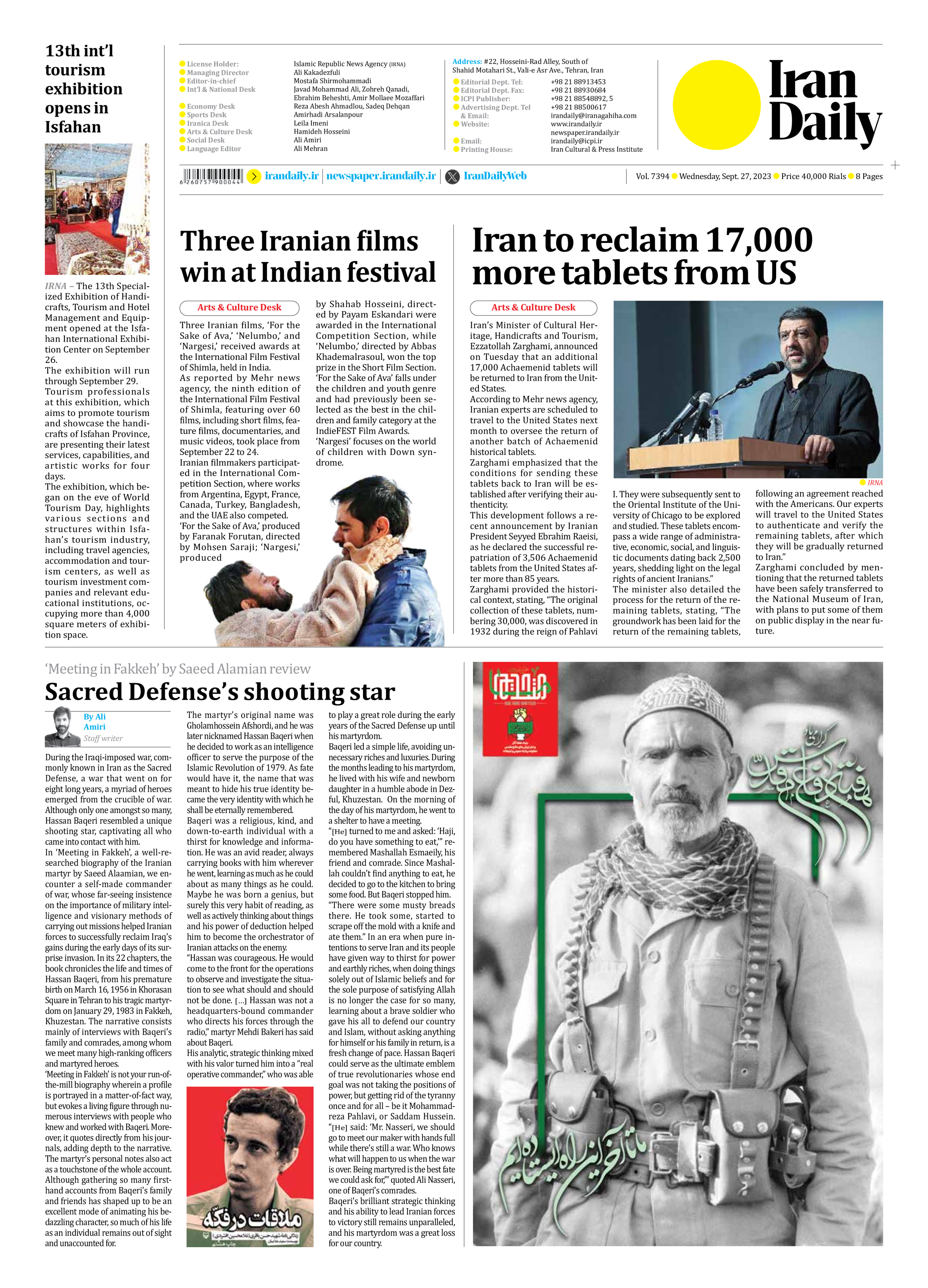
‘Meeting in Fakkeh’ by Saeed Alamian review
Sacred Defense’s shooting star
By Ali Amiri
Staff writer
During the Iraqi-imposed war, commonly known in Iran as the Sacred Defense, a war that went on for eight long years, a myriad of heroes emerged from the crucible of war. Although only one amongst so many, Hassan Baqeri resembled a unique shooting star, captivating all who came into contact with him.
In ‘Meeting in Fakkeh’, a well-researched biography of the Iranian martyr by Saeed Alaamian, we encounter a self-made commander of war, whose far-seeing insistence on the importance of military intelligence and visionary methods of carrying out missions helped Iranian forces to successfully reclaim Iraq’s gains during the early days of its surprise invasion. In its 22 chapters, the book chronicles the life and times of Hassan Baqeri, from his premature birth on March 16, 1956 in Khorasan Square in Tehran to his tragic martyrdom on January 29, 1983 in Fakkeh, Khuzestan. The narrative consists mainly of interviews with Baqeri’s family and comrades, among whom we meet many high-ranking officers and martyred heroes.
‘Meeting in Fakkeh’ is not your run-of-the-mill biography wherein a profile is portrayed in a matter-of-fact way, but evokes a living figure through numerous interviews with people who knew and worked with Baqeri. Moreover, it quotes directly from his journals, adding depth to the narrative. The martyr’s personal notes also act as a touchstone of the whole account. Although gathering so many first-hand accounts from Baqeri’s family and friends has shaped up to be an excellent mode of animating his bedazzling character, so much of his life as an individual remains out of sight and unaccounted for.
The martyr’s original name was Gholamhossein Afshordi, and he was later nicknamed Hassan Baqeri when he decided to work as an intelligence officer to serve the purpose of the Islamic Revolution of 1979. As fate would have it, the name that was meant to hide his true identity became the very identity with which he shall be eternally remembered.
Baqeri was a religious, kind, and down-to-earth individual with a thirst for knowledge and information. He was an avid reader, always carrying books with him wherever he went, learning as much as he could about as many things as he could. Maybe he was born a genius, but surely this very habit of reading, as well as actively thinking about things and his power of deduction helped him to become the orchestrator of Iranian attacks on the enemy.
“Hassan was courageous. He would come to the front for the operations to observe and investigate the situation to see what should and should not be done. […] Hassan was not a headquarters-bound commander who directs his forces through the radio,” martyr Mehdi Bakeri has said about Baqeri.
His analytic, strategic thinking mixed with his valor turned him into a “real operative commander,” who was able to play a great role during the early years of the Sacred Defense up until his martyrdom.
Baqeri led a simple life, avoiding unnecessary riches and luxuries. During the months leading to his martyrdom, he lived with his wife and newborn daughter in a humble abode in Dezful, Khuzestan. On the morning of the day of his martyrdom, he went to a shelter to have a meeting.
“[He] turned to me and asked: ‘Haji, do you have something to eat,’” remembered Mashallah Esmaeily, his friend and comrade. Since Mashallah couldn’t find anything to eat, he decided to go to the kitchen to bring some food. But Baqeri stopped him.
“There were some musty breads there. He took some, started to scrape off the mold with a knife and ate them.” In an era when pure intentions to serve Iran and its people have given way to thirst for power and earthly riches, when doing things solely out of Islamic beliefs and for the sole purpose of satisfying Allah is no longer the case for so many, learning about a brave soldier who gave his all to defend our country and Islam, without asking anything for himself or his family in return, is a fresh change of pace. Hassan Baqeri could serve as the ultimate emblem of true revolutionaries whose end goal was not taking the positions of power, but getting rid of the tyranny once and for all – be it Mohammadreza Pahlavi, or Saddam Hussein. “[He] said: ‘Mr. Nasseri, we should go to meet our maker with hands full while there’s still a war. Who knows what will happen to us when the war is over. Being martyred is the best fate we could ask for,’” quoted Ali Nasseri, one of Baqeri’s comrades.
Baqeri’s brilliant strategic thinking and his ability to lead Iranian forces to victory still remains unparalleled, and his martyrdom was a great loss for our country.







